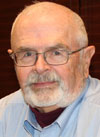 This article is adapted from the January 2010 Voice of Experience newsletter, published by the Senior Lawyers Division newsletter
This article is adapted from the January 2010 Voice of Experience newsletter, published by the Senior Lawyers Division newsletter
By Robert W. Swain, Senior Lawyers Division president, Appleton
Jan. 20, 2010 – My client deployed to Iraq last May; but about a year ago a family law legal problem came up. It required immediate attention. He went to see the post judge advocate. The JAG called the ABA Military Pro Bono Project. The project coordinator called me. “This involves a court action in your neighborhood,” he said. “Can you help?”
The ABA program, along with the adjunct program sponsored by the State Bar of Wisconsin, makes referrals to lawyers who volunteer to provide pro bono legal assistance to members of the United States military and their families. As a retired Air Force judge advocate, I felt an obligation to help out. I volunteered to join the list.
The ABA program is managed by Jason Vail at the ABA headquarters in Chicago. His list of volunteers is national in scope, and the ABA program is well known to judge advocate offices at military installations throughout the world. My client contacted me through the JAG at Ft. Sill, Texas.
The ABA’s Military Pro Bono Project is just over one year old; it already has more than 500 volunteer civilian lawyers. Through Dec. 4, 2009, the project made referrals in some 150 cases involving legal issues in 35 states. Between Nov. 2 and Dec. 4, 2009 the project made 41 new referrals, a 44 percent increase over the previous month. During the same one-month period, 35 active duty military lawyers and 20 civilian lawyers joined the list. Fifty-three Wisconsin lawyers are members of the ABA program.
The State Bar pro bono programs are overseen by Jeff Brown, pro bono coordinator. In addition, the Wisconsin National Guard maintains a list of lawyers who have volunteered to help guard members with legal problems. Currently more than 350 lawyers are on the guard’s list of volunteers. Ten Wisconsin lawyers have accepted referrals from the guard and are assisting guard members with a variety of legal problems.
My soldier-client is the father of a child born in 2000. At the time the child was born, he was not in the Army and was not married to the mother. He admitted paternity in an action brought by a child support agency and primary placement was awarded the mother who lives in Wisconsin.
In 2005, my client married another woman. Two years later he enlisted and was assigned to Ft. Bliss. Until the fall of 2008, all was quiet. But a year ago, after conducting an investigation, a county human services agency filed a CHIPS petition involving the child. My client traveled to Wisconsin and, with the approval of human services, made an agreement with Mom that at least until the CHIPS case was resolved their child could return with him to Ft. Bliss. A hearing on the CHIPS case was scheduled for February.
A soldier needed a lawyer, and suddenly I had a client.
At the hearing, the judge ruled that pending a home study the child could remain with my client and his wife in Texas. The judge also proposed that the parents resolve the custody issue in the original paternity case, and once this was done, the CHIPS case would probably be dismissed.
Texas authorities conducted a home study and found that even though my client was overseas, the child’s living arrangements with his wife were acceptable. I filed a motion for a change of primary placement. The motion is pending as this newsletter goes to press.
With the U.S.’ involvement in Iraq slowly winding down and its involvement in Afghanistan now rapidly building, repeat deployments have become commonplace. More and more soldiers, sailors, marines, and airmen will find themselves confronted by civil legal problems. My case involves family law as do a majority of requests for help. Requests, however, run the legal gamut from landlord/tenant to credit and bankruptcy, and beyond.
The ABA, State Bar of Wisconsin, and Marquette University Law School military pro bono programs offer experienced lawyers opportunities to help American servicemen and women who find themselves in need of legal assistance. Our member lawyers have experience in almost every area of the law; our division can and should be a source of volunteers.
Lawyers who volunteer have many resources available to help them handle cases. I’ve received guidance from a former partner who is a family law expert. Marquette University Law School’s volunteer program is called SAVLAW; its coordinator is Adie Olson. She is always looking for volunteers, and Marquette University law students are available to provide assistance to volunteers.
Contacts for the programs I’ve mentioned are:
And finally, for more information or questions on these or other military legal assistance opportunities, contact me by email or by phone at (920) 731-1913.
This article is published courtesy of the January 2010 State Bar Senior Lawyers Division newsletter, Voice of Experience. The State Bar offers its members the opportunity to network with other lawyers who share a common interest through its four divisions and 26 sections. Membership includes access to newsletters, email lists to facilitate information sharing, and other resources.
